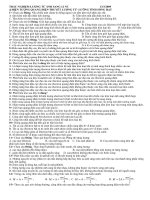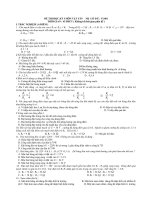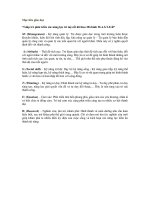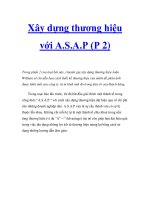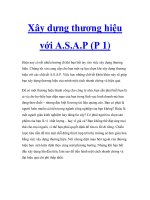Possession a romance A.S Byatt
Bạn đang xem bản rút gọn của tài liệu. Xem và tải ngay bản đầy đủ của tài liệu tại đây (8.06 MB, 573 trang )
P0S5E55I0N
A
ROMANCE
"This intelligent, literary, and ambitious thriller will take
its
place
along-
side
The
Name
ofthe
Rose
and
Waterlandas
Umberto
Eco's
scholarly
monk
and
Graham Swift's history teacher
are
joined
by another unconventional
type
of'natural
detective,' the literary
critic
[Byatt]
combines the drive
of
the thriller
with
the measured exploration
of
human nature more nor-
mally
associated
with
the nineteenth-century novel, and throughout she
threads the poetry and passion
of
'romance."'
—Tlie
Times
(London)
"In
this book,
[Byatt's]
clever, discursive talent at last finds its form.
Bursting
loose from the more or
less
naturalistic mode
of
its
predecessors
into what an epigraph from Hawthorne
calls
the
'latitude'
of
the romance,
this cerebral extravaganza of a story
zigzags
with
unembarrassed zest
across
an imaginative terrain bristling
with
symbolism and symmetries,
shimmering
with
myth and
legend,
and haunted
every
where by presences
of
the
past
Possession
is eloquent about the intense pleasures of
reading.
And,
with
sumptuous artistry, it provides a feast
of
them."
—Tlw
Sunday
Times
(London)
"Possession
is sure to get plenty of
praise,
as it
deserves;
it has earned the
right to
be
judged
by high
standards
.Possession
bids
fair
to be looked back
upon as one
of
the most memorable novels
of
the 1990s."
—Times
Literary
Supplement
"Iris
Murdoch had
better
look to her laurels. This is a marvelous novel,
well and truly in the Murdoch
class
at its
best On
academic
rivalry
and
obsession,
Byatt
is
delicious.
On the nature
of
possession—the
lover
by
the
beloved, the biographer by his
subject—she
is profound."
—Evening
Standard
"Possession
is a big book, a spectacular novel
of
ideas
and intrigue."
—London
Review
of
Books
"This is the sort of
plot
in which the hero gets the
girl,
villains
are
unmasked,
lovers
come
passionately
together, and lost children are found.
All
this has
a
welcome flavour
of
daring
and grandeur about it.
Possession
is
big, ambitious and
clever."
—Hie
Independent
52295
9"780394"586236
ISBN
Q-3TM-5fiL23-^
A.
S.
Byatt
has
earned
a
unique
reputa-
tion
as
a novelist who
manages
to com-
bine not only
passion
and intellect but the
life
of
the emotions
with
that
of
the mind.
Thjs
skill
is
shown at its
triumphant
best
in
Possession,
a
tour
de force
of
wit and
intelligence,
romance and
scholarship.
Like
John
Fowles's
The
Fretuh
Lieuten-
ants
Woman,
Possession
is
both
a modern
novel
and
a
high Victorian
novel.
Two
young
academics
are
researching
into the
lives
of,
respectively,
the
Browningesque
mid-Victorian
poet
Randolph Henry Ash
and
his
contemporary Christabel
LaMotte;
as
they
delve
deeper into the
turbulent
and
hitherto
unrelated
lives
of
the two poets through their letters,
journals
and poems, and trace their
move-
ments from London to the
north
York-*
shire
coast—from
spiritualist
seances
to
the
fairy-haunted
far west
of
Brittany—
a
bizarre and haunting counterpointing
and
correspondence
of
passions
and
ideas
begins
to
emerge.
An
astonishingly
rich
and
exhilarating
blend
of
mystery,
romance,
comedy, Victoriana and modern
university
novel—it
reaches
its climax on
a
storm-tossed
night in the churchyard
where Ash and his secret
are
buried—
Possession
is
A.
S.
Byatt's
finest and most
ambitious novel yet.
A.
S.
BYATT
has
written
five
books of
fiction—Shadow
of
a
Sun,
The
Game,
Tlie
Virgin
in
the
Garden,
Still
Life,
and
Sugar
and
Other
Stories.
She
taught
English
and
American literature at University
College,
London,
and
is
a
distinguished
critic and
reviewer. Her
critical
work includes
Degrees
if
Freedom
(a
study
of
Iris
Murdoch)
and
Unruly
Times:
Wordsworth
and
Coleridge
in
Their
Time,
Jacket
painting: "The
Beguiling
of
Merlin," by
Sir
Edward
Burne-Jones.
Courtesy
of
National
Museums and
Galleries
of
Merscyside,
Lady
Lever Art Gallery, Port Sunlight.
Random House, Inc., New York, N.Y.
10022
Printed in the U.S.A. 10/90
© 1990 Random House, Inc.
Same
Author
FICTION
Shadow
of a Sun
The Game
The Virgin in the Garden
Still
Life
Sugar
and
Other
Stories
CRITICISM
Degrees
of Freedom: The Novels of Iris Murdoch
Unruly Times: Wordsworth and Coleridge in Their Time
RANDOM
MOUSE.
NEWÏÏM
Copyright ©
1990
by A. S. Byatt
All rights reserved under International and Pan-American Copyright
Conventions. Published in the United States by Random House, Inc.,
New York. Originally published in Great Britain by
Chatto
and
Windus,
Limited, London.
Grateful acknowledgment is made to the following for permission
to reprint previously published material:
Cooperativa
Utopia:
Excerpt from "Melusina,
Malia
e Fobia del
Femminile,"
by
Silvia
Vegetti Finzi, from
Melusina,
Mito e
Leggende
di
una
Donna
Serpente,
Rome: Utopia,
1986.
Reprinted by permission.
W. W.
Norton
and
Editions
du Seuil: Excerpts from
Ecrits
by
Jacques
Lacan,
translated by Alan Sheridan. Published in the United States by W.
W.
Norton
and Company. Reprinted by permission of Editions du
Seiul
for the estate of
Jacques
Lacan and W.
W.
Norton
and Company, Inc.
The
Hogarth
Press,
Sigmund
Freud
Copyrights
and The
Institute
of
Psychoanalysis:
Excerpts from "An Outline of
Psychoanalysis"
and
"Totem
and Taboo," by
Sigmund
Freud, from The
Standard
Edition
of
the
Complete
Psychological
Works
of
Sigmund
Freud,
translated and edited by James Strachey.
Reprinted by permission.
Macmillan
Publishing
Company:
Excerpt from "For Anne Gregory," from The
Poems
of W. B.
Yeats:
A New
Edition,
edited by Richard J. Finneran. Copyright
1933
by Macmillan Publishing Company. Copyright renewed
1961
by
Bertha
Géorgie
Yeats. Reprinted by permission.
Oxford
University
Press:
Excerpt from "She Tells Her Love While Half
Asleep"
and
"Sick
Love," from
Collected
Poems
IÇ75,
by Robert Graves.
Copyright ©
1975
by Robert Graves. Reprinted by permission.
Library
of Congress
Cataloging-in-Publication
Data
Byatt,
A. S. (Antonia
Susan).
Possession
/ by A.S. Byatt.
p. cm.
ISBN
0-394-58623-9
I.
Title.
PR6052.Y2P6
1990
823'.914—dc20
Manufactured
in the
United
States
of
America
24689753
Book
design
by
Carole
Lowenstein
For
Isobel Armstrong
a writer
calls
his work a Romance, it need hardly be observed
that
he
wishes
to
claim
a
certain latitude,
both
as
to its fashion and
material,
which
he would not have felt himself entitled to assume, had he professed to be
writing
a
Novel.
The latter form
of
composition
is
presumed to aim at
a
very
minute fidelity, not merely to the
possible,
but to the probable and ordinary
course
of man's experience. The
former—while
as a work of art, it must
rigidly
subject
itself
to
laws,
and while it
sins
unpardonably so far as it may
swerve
aside
from the
truth
of the human
heart—has
fairly
a right to present
that
truth
under
circumstances,
to a great
extent,
of
the writer's own
choosing
or
creation. . . . The point of view in which this tale comes under the
Romantic
definition
lies
in the
attempt
to connect a bygone time
with
the
very
present
that
is
flitting
away from us.
—NATHANIEL
HAWTHORNE
Preface
to The
House
of
the
Seven
Gables
Seem
nigh on
bursting,—if
you nearly see
The real world through the
false,—what
do
you
see?
Is
the old so ruined? You
find
you're in a flock
O'
the youthful, earnest,
passionate—genius,
beauty,
Rank
and wealth
also,
if you care for these:
And all depose their natural rights, hail you,
(That's me, sir) as their mate and yoke-fellow,
Participate
in
Sludgehood—nay,
grow mine,
I
veritably
possess
them—.
. .
And all this might be, may be, and
with
good help
Of
a little
lying
shall
be: so
Sludge
lies!
Why, he's at worst your
poet
who
sings
how Greeks
That never were, in Troy which never was,
Did this or the other impossible great thing! . . .
But
why do I mount to poets? Take plain
prose—
Dealers
in common
sense,
set these at work,
What
can they do
without
their helpful
lies?
Each
states the law and fact and face o' the thing
Just
as he'd have them, finds what he thinks fit,
Is
blind to what missuits him, just records
What
makes his
case
out, quite ignores the rest.
It's
a History of the World, the Lizard Age,
The
Early
Indians, the Old Country War,
Jerome Napoleon, whatsoever you please.
All
as the author wants it. Such a scribe
You
pay and praise for putting
life
in stones,
Fire
into fog, making the past your world.
There's plenty of 'How did you contrive to
grasp
The thread which led you through this labyrinth?
How build such
solid
fabric out of
air?
How on so slight foundation found this tale,
Biography,
narrative?' or, in other words,
'How many
lies
did it require to make
The portly
truth
you here present us with?'
—Robert
Browning
from "Mr
Sludge,
'the Medium' "
The serpent at its root, the fruit of gold
The woman in the shadow of the boughs
The running water and the
grassy
space.
They are and were there. At the old world's rim,
In
the Hesperidean grove, the fruit
Glowed golden on eternal boughs, and there
The dragon Ladon crisped his jewelled crest
Scraped
a gold claw and sharped a silver
tooth
And dozed and waited through eternity
Until the tricksy hero Herakles
Came to his dispossession and the
theft.
—RANDOLPH
HENRY ASH
from The Garden of
Proserpina,
1861
(^Sg
he book was thick and black and covered
with
dust.
t~^r.
Its boards were bowed and creaking; it had been mal-
treated in its own time. Its spine was missing, or, rather,
protruded
from amongst the leaves like a bulky marker. It was
bandaged
about and about
with
dirty
white
tape, tied in a neat bow.
The librarian handed it to Roland Mitchell, who was sitting waiting
for
it in the Reading Room of the London Library. It had been
Ill
POSSESSION
exhumed from Locked
Safe
no. 5, where it usually stood between
Pranks
of
Priapus
and The
Grecian
Way of
Love.
It was ten in the
morning, one day in September
1986.
Roland had the small
single
table he liked best, behind a square pillar,
with
the clock over the
fireplace nevertheless in full view. To his right was a high sunny
window, through which you could see the high green leaves of St
James's
Square.
The London Library was Roland's favourite place. It was shabby
but civilised, alive
with
history but inhabited
also
by living poets
and thinkers who could be found squatting on the slotted metal
floors
of
the stacks, or arguing pleasantly at the turning of the stair.
Here Carlyle had come, here George Eliot had progressed through
the bookshelves. Roland saw her black
silk
skirts, her velvet trains,
sweeping compressed between the Fathers of the Church, and heard
her
firm
foot ring on metal among the German poets. Here Ran-
dolph Henry Ash had come, cramming his elastic mind and memory
with
unconsidered trifles from History and Topography, from the
felicitous alphabetical conjunctions of Science and
Miscellaneous—
Dancing,
Deaf and Dumb, Death, Dentistry, Devil and
Demonology, Distribution,
Dogs,
Domestic Servants, Dreams. In
his
day, works on Evolution had been catalogued under Pre-Ada-
mite
Man. Roland had only recently discovered
that
the London
Library
possessed Ash's own copy of Vico's
Principi
di una Scienza
Nuova. Ash's books were most regrettably scattered across Europe
and America. By far the largest
single
gathering was of course in
the Stant Collection at Robert Dale
Owen
University in New
Mexico, where Mortimer Cropper worked on his monumental
edition of the
Complete
Correspondence
of
Randolph
Henry Ash.
That
was
no problem nowadays, books travelled the aether like light and
sound. But it was just possible
that
Ash's own Vico had marginalia
missed
even by the indefatigable Cropper. And Roland was looking
for
sources for Ash's
Garden
of
Proserpina.
And
there
was a pleasure
to be had from reading the sentences Ash had read, touched
with
his
fingers,
scanned
with
his
eyes.
It was immediately clear
that
the book had been undisturbed for
a
very long time, perhaps even since it had been laid to rest. The
A.S.
BYATT
HI
librarian
fetched a checked duster, and wiped away the dust, a black,
thick, tenacious Victorian dust, a dust composed of smoke and fog
particles accumulated before the Clean Air acts. Roland undid the
bindings.
The book sprang apart, like a box,
disgorging
leaf
after
leaf
of faded paper, blue, cream,
grey,
covered
with
rusty writing,
the brown scratches of a steel nib. Roland recognised the handwrit-
ing
with
a shock of excitement. They appeared to be notes on Vico,
written
on the backs of book-bills and letters. The librarian observed
that
it didn't look as though they had been touched before. Their
edges,
beyond the
pages,
were dyed soot-black,
giving
the impres-
sion
of the borders of mourning cards. They coincided precisely
with
their present positions, edge of page and edge of stain.
Roland
asked if it was in order for him to study these jottings.
He
gave
his credentials; he was
part-time
research assistant to Profes-
sor
Blackadder, who had been editing Ash's
Complete
Works since
1951.
The librarian
tiptoed
away to telephone: whilst he was gone,
the dead leaves continued a kind of rustling and shifting, enlivened
by their release. Ash had put
them
there. The librarian came back
and
said
yes, it was quite in order, as long as Roland was very
careful not to disturb the sequence of the interleaved fragments until
they had been listed and described. The librarian would be
glad
to
know of any important discoveries Mr Michell might make.
All this was over by ten-thirty. For the
next
half-hour Roland
worked haphazardly, moving backwards and forwards in the Vico,
half
looking for Proserpina,
half
reading Ash's notes, which was not
easy,
since they were
written
in various
languages,
in Ash's annotat-
ing
hand, which was reduced to a
minute
near-printing, not imme-
diately
identifiable as the same as his more generous poetic or
letter-writing hand.
At eleven he found
what
he thought was the relevant
passage
in
Vico. Vico had looked for historical fact in the poetic metaphors
of
myth and legend; this piecing together was his "new science."
His Proserpine was the corn, the origin of commerce and commu-
nity. Randolph Henry Ash's Proserpine had been seen as a Victorian
reflection of religious
doubt,
a meditation on the
myths
of resurrec-
tion. Lord Leighton had painted her, distraught and floating, a
Ill
POSSESSION
golden
figure in a tunnel of darkness. Blackadder had a belief
that
she
represented, for Randolph Ash, a personification of history itself
in
its early mythical
days.
(Ash had
also
written
a poem about
Gibbon and one about the Venerable
Bede,
historians of greatly
differing
kinds. Blackadder had
written
an article on R. H. Ash and
relative historiography.)
Roland
compared Ash's
text
with
the translation, and copied
parts onto an index card. He had two boxes of these, tomato-red
and an intense
grassy
green,
with
springy plastic hinges
that
popped
in
the library silence.
Ears
of grain were called apples of gold, which must have been
the first gold in the world while metallic gold was unknown
So the golden apple which Hercules first brought back or
gathered from Hesperia must have been grain; and the Gallic
Hercules
with
links of this gold,
that
issue from his
mouth,
chains
men by the ears: something which will later be discovered as a
myth concerning the fields. Hence Hercules remained the Deity
to propitiate in order to
find
treasures, whose god was Dis
(identical
with
Pluto) who carries off Proserpine (another name
for
Ceres or
grain)
to the underworld described by the poets,
according
to whom its first name was Styx, its second the land
of
the dead, its third the
depth
of furrows. It was of this
golden
apple
that
Virgil, most learned in heroic antiquities, made
the golden bough Aeneas carries into the Inferno or Underworld.
Randolph Henry Ash's Proserpina, "gold-skinned in the gloom,"
was
also
"grain-golden." Also "bound
with
golden links" which
might have been jewellery or chains. Roland
wrote
neat cross-
references under the headings of grain, apples, chain, treasure.
Folded into the page of Vico on which the passage appeared was
a
bill for candles on the back of which Ash had
written:
"The
individual
appears for an instant, joins the community of thought,
modifies
it and dies; but the species,
that
dies not, reaps the fruit of
his
ephemeral existence." Roland copied this out and made another
card, on which he interrogated himself: "Query? Is this a quotation
A.S.
BYATT
HI
or is it Ash himself? Is Proserpina the Species? A very
C19
idea. Or
is
she the individual?
When
did he put these papers in here? Are
they pre- or
post-The
Origin of
Species?
Not conclusive
anyway—
he cd have been interested in Development generally. . .
."
That
was eleven-fifteen. The clock ticked, motes of dust danced
in sunlight, Roland meditated on the tiresome and bewitching
endlessness
of the quest for knowledge. Here he sat, recuperating a
dead man's reading, timing his exploration by the library clock and
the faint constriction of his belly. (Coffee is not to be had in the
London Library.) He would have to show all this new treasure-
trove to Blackadder, who would be
both
elated and grumpy, who
would anyway be pleased
that
it was locked away in
Safe
5 and not
spirited away to Robert Dale
Owen
University in Harmony City,
with
so much else. He was reluctant to tell Blackadder. He enjoyed
possessing
his knowledge on his own. Proserpina was between pages
288
and 289. Under page 300 lay two folded complete sheets of
writing paper. Roland opened these delicately. They were
both
letters in Ash's flowing hand,
both
headed
with
his Great Russell
Street address and dated, June
21st.
No year. Both began "Dear
Madam," and
both
were unsigned. One was considerably shorter
than the
other.
Dear Madam,
Since
our
extraordinary conversation
I
have thought
of
nothing else.
It
has not often
been
given
to
me as a poet,
it
is perhaps not
often
given
to
human
beings,
to
find such ready sympathy, such
wit
and judgment together.
I
write
with
a
strong sense
of
the necessity
of
continuing
our
talk,
and
without
premeditation, under the impression that you were indeed as much struck
as
I
was
by
our quite extraordinary
to ask if it
would be possible
for me to
call
on you, perhaps one day next week.
I
feel,
I
know
with
a
certainty that cannot
be
the
result
of
folly
or
misapprehension, that you and
I
must speak again.
I
know you
go out in
company very little,
and
was
the
more
fortunate that
dear
Crabb managed
to
entice
you to his
breakfast table.
To
think that
amongst the babble
of
undergraduate
humour and through
all
Crabb's
well-
wrought
anecdotes, even including
the
Bust,
we
were able
to say so
much,
that was significant, simply
to
each other.
I
cannot surely
be
alone in feeling
5
HI
POSSESSION
The second one ran:
Dear
Madam,
Since
our pleasant and unexpected
conversation
I have thought of little
else.
Is there any way in which it can be
resumed,
more
privately and at more
leisure?
I know you go out in company very little, and was the
more
fortunate
that
dear Crabb managed to entice you to his breakfast table. How much I
owe
to his continuing
good
health,
that
he should feel able and eager, at
eighty-two years
of
age,
to
entertain
poets and
undergraduates
and mathemati-
cal
professors
and political thinkers so early in the day, and to tell the
anecdote
of
the Bust
with
his
habitual
fervour without too much delaying the
advent
of
buttered toast.
Did you not find it as strange as I did,
that
we should so
immediately
understand
each
other so well? For we did
understand
each
other uncommonly
well, did we not? Or is
this
perhaps a product of the over-excited brain of
a middle-aged and somewhat
disparaged
poet,
when
hefnds
that
his ignored,
his arcane, his deviously perspicuous meanings, which he thought not
meanings, since no one appeared able to understand them, had after all one
clear-eyed
and amused reader and judge?
What
you said of
Alexander
Selkirk's monologue, the
good
sense you
made
of
the
ramblings of
my
John
Bunyan,
your understanding
of
the passion
of
Inez de Castro . gruesomely
resurrecta
. . . but
that
is enough of my egoistical
mutter,
and of
those
of my
personae, who are not, as you so rightly remarked, my masks. / would not
have you
think
that
I do not
recognise
the superiority of your own fine ear
and finer taste. I am convinced
that
you
must
undertake
that
grand Fairy
Topic—you
will
make
something highly strange and original of it. In
connection
with
that,
I wonder if you have thought of Vico's history of the
primitive
races—of
his
idea
that
the ancient gods and later heroes are
personifications
of
the fates and
aspirations
of
the people rising in figures from
the common mind? Something here might be
made
of
your Fairy's legendary
rootedness
in veritable castles and genuine agricultural
reform—one
of the
queerest
aspects
of
her
story, to a modern
mind.
But I run on again; assuredly
you have determined on your own best
ways
of presenting the topic, you who
are so wise and learned in your retirement.
I
cannot
but
feel, though it may be an illusion induced by the
delectable
drug of
understanding,
that
you
must
in some way share my
eagerness
that
further
conversation
could be
mutually
profitable
that
we
must
meet. I cannot
do not
think
I
amcan
be
mistaken
in my belief
that
our meeting was also
A.
S.
BY
ATT
HI
important
interesting
to you, and
that
however
much
you may
value
your
seclusion
I
know
that
you
came
only
to
honour
dear
Crabb,
at a
small
informal
party,
because
he
had
been
of
assistance
to
your
illustrious
Father,
and
valued
his
work
at a
time
when
it
meant
a
great
deal
to him. But you did
come
out,
so I may
hope
that
you can be
induced
to
vary
your
quiet
days
with
I
am
sure
you
understand
Roland
was first profoundly shocked by these writings, and
then,
in his scholarly capacity, thrilled. His mind busied itself automati-
cally
with
dating and placing this unachieved dialogue
with
an
unidentified woman. There was no year on the letters, but they must
necessarily
come after the publication of Ash's dramatic poems,
Gods, Men and
Heroes,
which had appeared in
1856
and had not,
contrary to Ash's hopes and perhaps expectations, found favour
with
the reviewers, who had declared his verses obscure, his tastes per-
verse
and his people extravagant and improbable. "The Solitary
Thoughts of Alexander Selkirk" was one of those poems, the mus-
ings
of the castaway sailor on his island. So was "The Tinker's
Grace," purporting to be Bunyan's prison musings on Divine Grace,
and so was Pedro of Portugal's
rapt
and bizarre declaration of love,
in
1356,
for the embalmed corpse of his murdered wife, Inez de
Castro, who swayed beside him on his travels, leather-brown and
skeletal,
crowned
with
lace and gold circlet, hung about
with
chains
of
diamonds and pearls, her bone-fingers fantastically ringed. Ash
liked his characters at or over the edge of madness, constructing
systems
of belief and survival from the fragments of experience
available
to
them.
It would be possible, Roland thought, to identify
the breakfast party, which must have been one of Crabb Robinson's
later efforts to provide stimulating conversation for the students of
the new London University.
Crabb Robinson's papers were
kept
in Dr
Williams's
Library in
Gordon Square, originally designed as University Hall, supported
by Robinson as a place in which lay students could experience
collegiate
university
life.
It would, it must, be
easy
to check in
Robinson's
diary an occasion on which Ash had breakfasted at 30
